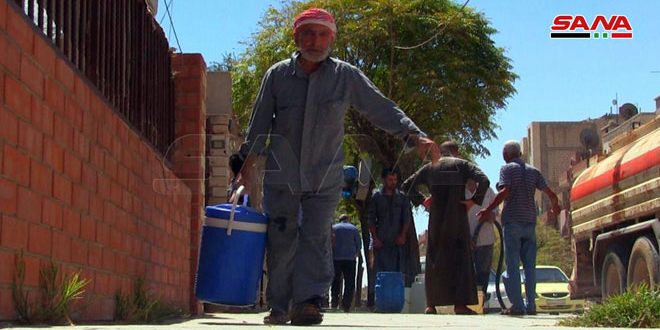As the Turkish occupation persists in cutting off drinking water from Hasaka, the suffering continues
In light of the Turkish occupation’s control of Alouk station, which is the main source of drinking water for more than a million civilians, the suffering of the people of Hasakah continues, depicted in their daily search to secure a few liters of water to quench the family’s thirst.
 Dozens of children, elderly and women gather daily around water tanks that are provided by government agencies in cooperation with the organizations, but they do not meet their needs, especially since there are areas that these tanks do not reach due to the great pressure on them and their distance from the city center. Some people have resorted to the outskirts of neighborhoods to secure drinking water from salty wells, as they have no other choice.
Dozens of children, elderly and women gather daily around water tanks that are provided by government agencies in cooperation with the organizations, but they do not meet their needs, especially since there are areas that these tanks do not reach due to the great pressure on them and their distance from the city center. Some people have resorted to the outskirts of neighborhoods to secure drinking water from salty wells, as they have no other choice.

Transporting water through gallons and utensils has become a daily scene for the people of Hasaka who are searching for potable water. The majority of the people living on the outskirts of the city of Hassak struggle to get water and walk long distances in search of a tanker, as they have no financial ability to buy mineral water.
 The Alouk station is located east of Ras al-Ain city near the Syrian-Turkish border and includes 30 wells, one of which is pumping 200 cubic meters per hour towards Hasakah. But since the Turkish occupation forces and their mercenaries took control of the station before the beginning of this year, pumping has stopped and water was cut off repeatedly for long periods of more than a million residents of Hasakah.
The Alouk station is located east of Ras al-Ain city near the Syrian-Turkish border and includes 30 wells, one of which is pumping 200 cubic meters per hour towards Hasakah. But since the Turkish occupation forces and their mercenaries took control of the station before the beginning of this year, pumping has stopped and water was cut off repeatedly for long periods of more than a million residents of Hasakah.
The station was put into service in 2013. When the project was established, the project was a reserve and not a strategic one, but it is now the only source of drinking water for the city of Hasakah and its neighborhoods.
A number of residents of the city of Hasakah expressed their anger at the damage and pressure pursued by the Turkish occupation that disregards all international norms and laws.
A mother of a handicapped child who lives on the outskirts of Aziziyah neighborhood, expressed her suffering, saying: “Thirst is more dangerous than the Corona virus. Water has not reached us for 20 days. I am the sole breadwinner for my child. I have to search every day for a nearby tank to secure my needs for drinking water. This is a crime against humanity and a stain on everyone trying to starve the people of Hasakah.”
The locals of Hasakah confirmed that the problem is aggravated and that the situation is unbearable, calling on all international parties to intervene.
This is the case of the people of Hasaka today, in light of the Turkish regime’s continued use of water as a weapon of war against civilians- thus cutting off water represents a crime against humanity amidst an utter international silence.
Inas Abdulkareem

